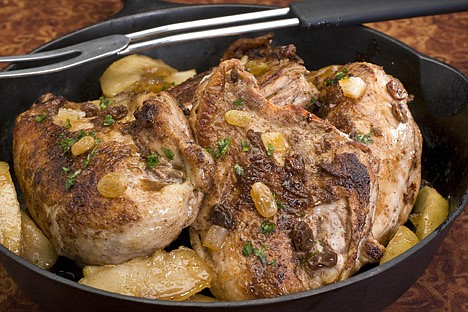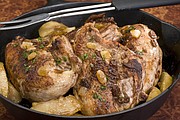The symbolic foods of Rosh Hashana
More than other Jewish holidays, Rosh Hashana is rich with foods are steeped in symbolism.
That's because the start of the Jewish new year, usually marked with a seder, or celebratory meal, is meant to focus on hope, optimism and wishes for the coming year.
But for those unfamiliar with Jewish traditions, sifting through the symbolism can be confusing. So here's a primer on mainstays of the meal and why they are consumed.
Laura Frankel, author of "Jewish Slow Cooker Recipes," says apples and honey are traditional parts of the meal because they are sweet and speak to the desire for a sweet year to come.
Challah, the braided egg bread traditionally served by Jews on the Sabbath, is shaped into spirals or rounds during Rosh Hashanah to represent the continuity or circle of life. Often raisins or honey are added to the recipe in order to make the loaves extra sweet.
Pomegranates are eaten because they have many seeds, which are symbolic of the many good deeds, or mitzvahs, we hope to perform in the next year, says Frankel.
Foods such as pumpkins, squash and beets grow rapidly in the fall and therefore are considered signs of fertility, prosperity and abundance.
Along the same lines, many stuffed foods, such a turnovers and roasts, are served in hopes of a year filled with blessing.
Some of the foods are simply plays on words or puns, and are eaten because the word for them sounds like something that is wished for. Leeks, for instance, often are consumed in hopes that enemies will be vanquished in the year to come because the Hebrew word for the pungent vegetable is similar to the word for destroyed.
These plays on words can be quite whimsical, notes Frankel, who says that some people put celery and raisins together on their Rosh Hashana table so that they might look forward to a "raise in salary."
For her own Rosh Hashana celebration, Frankel likes to prepare a sweet and aromatic dish such as a lamb tagine, a slow-cooked stew, which is made with dried fruits and seasoned with cinnamon and cardamom.
Because the holiday falls so early this year, Frankel is taking the opportunity to use late summer produce to make a tomato-apple chutney, sweetened with browned sugar and reduced with wine instead of the more traditional vinegar, which is avoided during Rosh Hashanah so that sourness will not be associated with the new year.



